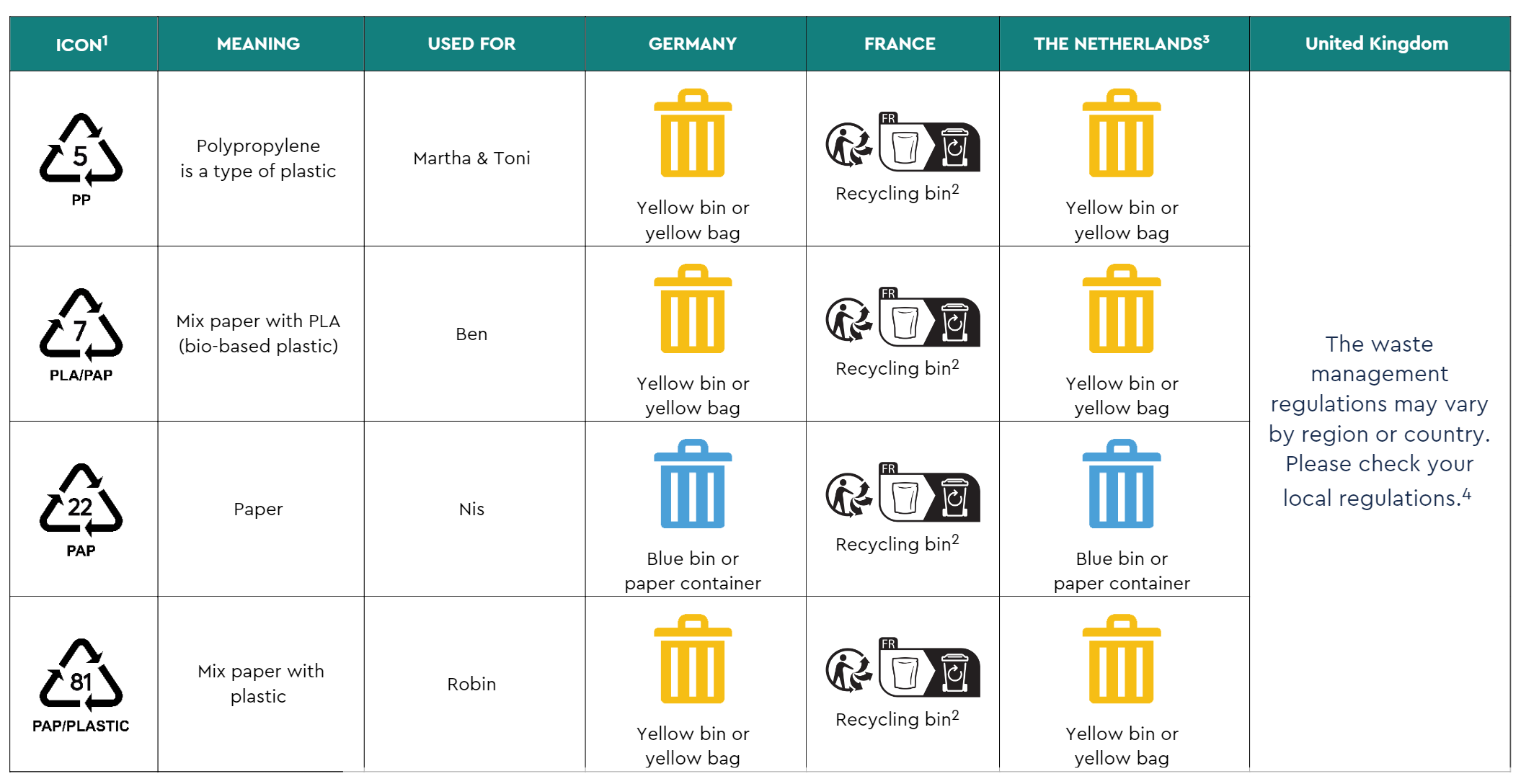How to dispose of our packaging
How do you and your customers dispose of Packiro packaging? What do you need to know about waste separation of our materials? And how is it done in other countries? We provide answers to these questions here.
The following overview does not provide any general information on the separation of packaging in the respective countries. It only refers to Packiro packaging.

1 Please be aware that this icon can be used as indication on the packaging, but it is forbidden to use it in case the packaging is sold in Italy.
2 The so-called "Info tri" is mandatory for all paper and household packaging sold in France. Specific sorting instruction may vary by region, please check Citeo information on waste management in France.
³ The waste management regulations vary by region or country. Please check your local regulations.
4 The government website provides information on local regulations in the UK: Waste management in UK
About packaging and its disposal
Unfortunately, packaging often results in lots of waste. To minimise environmental pollution, waste must be disposed and recycled properly. To ensure that packaging resources can be reused as much as possible, it is important to separate waste in the right manner to enable recycling.
Waste management in Germany
In Germany, waste separation is standardised across the country.
Depending on the material, waste belongs in the residual waste bin (grey or black), the organic waste bin (brown or green), the paper bin (blue) or the recycling bin (yellow), better known as the yellow bin or yellow bag.
The Packiro material heroes Toni, Martha, Ben and Robin are made from different materials. This determines if the packaging is recyclable or not. However as all Packiro’s product are only packaging, they should all go in the yellow bin.
How should I dispose of Martha packaging?
Packaging produced with our "Metallised Martha" material is made of monoplastic (PP) and belongs in the yellow bin/yellow bag. Thanks to the monomaterial structure, Martha can be fully recycled.
How should I dispose of Robin packaging?
Packaging produced with our "Robust Robin" material is made from different materials: paper and plastic. We refer to this as a so-called "composite packaging". Due to its composition, this packaging is not recyclable. But as any packaging it still belongs in the yellow bin.
How should I dispose of Ben packaging?
Packaging produced with our material "Biobased Ben" material is made of biobased plastics. These belong in the yellow bin.
Unfortunately, the sorting facilities for light packaging from the yellow waste bin are not yet able to distinguish between biobased and other plastics, so biobased packaging cannot enter the recycling stream.
Waste management in the United Kingdom
The UK approach is based on the "National Waste Strategy", a policy introduced by the Department for Environment, Food and Rural Affairs (Defra) that aims at promoting sustainability in waste management throughout the UK.
The types of waste bins and their colour coding may vary a lot by region, but there are some common, standadised categories used across the country:
General waste bins: typically black or grey. They are used for non-recyclable waste.
Recycling bins: usually coloured in green. They are used for recyclable materials like plastic bottles and metal cans, but also paper and cardboard waste. Are often found at local supermakets.
Food and Garden waste Bins: usually brown and are used for organic waste.
How to dispose of our Packiro packaging in the UK?
Our monoplastic (PP) materials Toni and Martha are recycable. That is why they can be disposed in the recycling bin which is usually located at your nearby local supermarket.
Our biobased material Ben is made from biobased plastics and is to be disposed in the standard residual waste.
Our composite packaging material Robin is not recycable and is to be disposed in the standard residual waste as well.
Please note that waste management regulations may highly vary per region or country. We recommend to check with your local authorities.